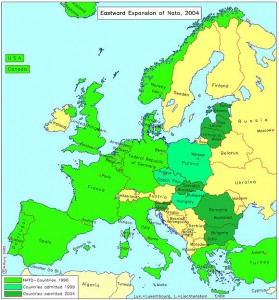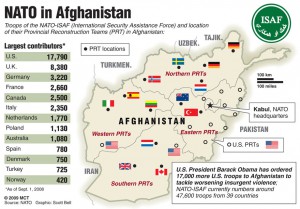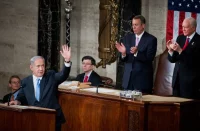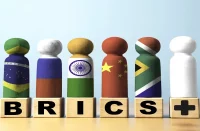The Idea of NATO was somehow a byproduct of Cold War power tussle between USA and USSR. It was not only a means of maintaining balance of power in Europe vis-à-vis USSR’s superiority in conventional arms and fighting force, but it also meant to integrate the US with Europe as well. With the end of cold war, questions have been raised with regard to the necessity of and justification for NATO’s existence. Notwithstanding criticism, Bush Administration’s National Security Strategy (NSS) not only called for NATO’s active role but also its expansion, including those countries which are willing to share the burden. Since the disintegration of the Soviet Union, NATO has expanded twice: in 1999 when it included countries from Eastern Europe like Hungry and Poland; and in 2004 when it included Baltic States like Latvia, Lithuania, and Bulgaria etc. While the establishment of the European Union can serve, to some extent, as a counterbalance for NATO; however, in the wake of new roles of Russia and EU, both Europe and USA have to see what role NATO can play in the evolving dynamics of International political security, especially with its growing shift towards Asia. In order to sort out the role of NATO, or redefine its purposes and objectives of establishment, we have to keep in mind certain policy factors which may very well be summarized as: European goals and objectives, US’ Strategic Interests in Europe and beyond, NATO’s military commitments, NATO-Russian Relations, and the political will of certain key European nations. Another fact which has to be kept in mind while analyzing the future of NATO is that the U.S. Defense  Department during the last decade has undertaken a systematic realignment of military forces and bases overseas; —– Michael T. Klare identifies multiple U.S. geopolitical interests behind this realignment — controlling other countries’ access to resources, a shift from defensive to offensive operations, and uncertainty about the future reliability of long-term allies, especially those in ‘Old Europe”. The peculiar “uncertainty factor” not only hints at the changing configuration of the US-Europe relations, but also explains the US’ shift towards Asia, or the “Asia Pivot” policy.
Department during the last decade has undertaken a systematic realignment of military forces and bases overseas; —– Michael T. Klare identifies multiple U.S. geopolitical interests behind this realignment — controlling other countries’ access to resources, a shift from defensive to offensive operations, and uncertainty about the future reliability of long-term allies, especially those in ‘Old Europe”. The peculiar “uncertainty factor” not only hints at the changing configuration of the US-Europe relations, but also explains the US’ shift towards Asia, or the “Asia Pivot” policy.
With the end of cold war, EU’s dependence on USA has lessened and its own position has altered. US-Europe schism seems to be increasing conspicuously displayed with regard to the question of Iraq war, the US’s policy of “Asia pivot” and decreasing importance of its interests in European security. European interests and goals are not necessarily consistent with those of USA. Many analysts believe widespread hostility toward US foreign policy and fear of US willingness to use force in the Middle East could help push the EU toward a unity it has been previously unable to achieve.’ Increasingly, Europeans are more likely to view the key to their future as being more closely tied to the EU than with NATO. France and Germany are outspoken in their demands to lift restrictions on sales of weapon sales to China. Germany has already gone ahead in improving its bi-lateral relations with China. Similarly, although, EU constitution makes provisions for close cooperation between EU and NATO, EU has taken over certain missions from NATO in some areas like Bosnia, and also deployed its troops in Congo and Macedonia in 2003. On the whole, EU constitution does not envisage NATO as a desirable element, rather superfluous in essence. But NATO is relevant to the US interests, and as long as US maintains good relations with important NATO/EU members, NATO’s future and relevance seems secure. It is so because EU is still evolving and facing crisis, and is not in a position to take over charge of military affairs.
On the other hand, clearly discernible and historically proven facts of the US strategy for Europe show that the US wants to maintain its hegemony in Europe in order to prevent the rise of any powerful, and hegemonic state the way it happened in 1930s (case of Germany), and then in late 1940s (case of the USSR). In order to maintain its dominant position, US must keep powerful European states within the constraints of the US created post war system. Through NATO, US want to two objectives with regard to Europe: 1) Relevance and dominance in European Affairs, 2) Countering growing influence of the European Union. In other words, US policy in Europe is not merely to counter other states’ bids for hegemony but to maintain its own hegemony. Europe is still very much relevant to the US’ twenty-first century objectives, which link the maintenance of the US global dominance to US’ domination of the European landmass. It is for this reason that the US has, with the help of its core European allies, redefined and expanded the traditional (cold war) domain of NATO operations, leading to defining not only new operational doctrines, but also new forces which suit the US’ critical objectives related to Europe as well as Asia.
The end of cold war has transformed NATO’s role form that of a defensive military organization to an offensive one. It is being used for pre-emptive, interventionist and offensive purposes. NATO’s participation in Afghanistan war has created new out of the area role for it. In 2003, NATO Response Force was created in Netherlands that could be deployed within five days anywhere in the world and could sustain itself up to a month on wide range missions. It was created to counter threats from International terrorists. NATO has five million troops under it but the member countries have shown little inclination to commit them in any far-off NATO mission. At best, total number of NATO troops in Afghanistan in 2004 was just 8400; while 85% of the total troops were American, Britain and Poland provided the bulk of the rest. By continuing to cultivate NATO, the US aims to keep the Europe Union engaged militarily in the world in the name of Global War on Terrorism, hence burden sharing of military operations around the world.
The NATO-Russia founding ACT of 1997 provides Russia with voice but not veto and ensures that Russia will be consulted on key European security issues outside Europe. However many east European NATO members continue to see NATO’s role in historical terms, that is protection against any Russian aggression. Some Poles, for instance, believe that President Putin’s goal is to consolidate his power in Russia, then recreate the USSR and impose his domination over Eastern Europe, as Russian leaders have done for centuries. For them, joining NATO was the only way for Poland to protect itself from this danger. Russia too does not seem to be satisfied with NATO’s eastward expansion. Although EU-Russian relations have improved, neither USA nor EU sees Russia as a friend or an ally, so is the case with Russia itself. Although Moscow’s relatively muted response to the 2004 NATO expansion is in stark contrast to her vocal opposition in 1999, NATO’s methodical eastward expansion has created new levels of mistrust and suspicion. The old cold war perceptions exist and continue to guide the policies and actions of the contestants. As such Russian factor continues to provide justification for maintaining NATO, hence close alliance of US and Europe.
Future of any organization depends upon the will of States to remain committed to its aims and objectives, and to adjust to new demands and obligations. The ten additions to NATO since 1999 are demonstrative of this will. However, the key measure of political will is that which emanates from its four key members: France, Germany, UK and USA. While other member States will exert influence, the cornerstone of debate on NATO’s future would depend upon these members. Because America’s perception of war on terror is not widely shared, the US might face some sort of isolation. However, US’s special relations with London, and EU’s growing economic difficulties provide the US with leverage over EU and enables it to keep making use of NATO in achieving its global objectives.
In the light of above discussed factors, USA and European countries can have three main options with regard to its future. The first is that of further expansion. NATO has created Membership Action Plan (MAP) for enhancing its membership. Although, MAP does not assure its expansion, it does reflect member countries’ interest in expanding its membership and consequently role. But there are certain problems with regard to inclusion of certain countries in NATO such as Russia. Furthermore, Russian inclusion might hinder US’s using NATO as an ‘interventionist’ organization. On the other hand, it is also not clear that any of NATO’s current members want to add Russia to the alliance. Former Soviet satellites, including Hungary, Bulgaria, Slovakia and the Czech Republic, as well as the Baltic states, would almost certainly oppose it, given their long-standing (and historically justified) fear of Russian expansionist intentions. It is also unclear whether NATO’s core members, including Great Britain, France and Germany, would support such a move, since Russian membership would include an economic cost and EU nations might be reluctant to spend any capital. However, inclusion of other countries might add to military muscle of NATO and increase its reach throughout the world.
 In view of NATO’s recent expansions, and the role it has played in Afghanistan and Libya operations, contraction does not seem a feasible option. None of NATO’s current members have shown any intention of either withdrawing from it or voting other members out. Such a policy is likely to be counterproductive and may trigger dissensions. On the other hand, the obvious advantage of maintaining the status quo is that current members can maintain their political base. Each new member gains a voting interest in the alliance, and therefore, its own piece of pie. It is for this reason and importance of NATO in providing certain strategic and political advantages that the old members such as Germany and France rightly see new additions as ‘potential competitors’ and aspirants for prestige within the alliance. On other hand, policy of non-expansion may prove to be costly in that it may result in EU taking over its position in Europe and in the world, which would be disadvantageous not only to the but also to certain European powers.
In view of NATO’s recent expansions, and the role it has played in Afghanistan and Libya operations, contraction does not seem a feasible option. None of NATO’s current members have shown any intention of either withdrawing from it or voting other members out. Such a policy is likely to be counterproductive and may trigger dissensions. On the other hand, the obvious advantage of maintaining the status quo is that current members can maintain their political base. Each new member gains a voting interest in the alliance, and therefore, its own piece of pie. It is for this reason and importance of NATO in providing certain strategic and political advantages that the old members such as Germany and France rightly see new additions as ‘potential competitors’ and aspirants for prestige within the alliance. On other hand, policy of non-expansion may prove to be costly in that it may result in EU taking over its position in Europe and in the world, which would be disadvantageous not only to the but also to certain European powers.
Dissolving alliance, favoured by some, would mitigate the risks associated with its expansion and ease tensions with Russia. The rise of EU would suffice to fill the gap created by dissolution of the alliance. It also seems likely that most European States want to see Europe free from US pressure and intervention in European affairs. But it is highly unlikely to happen in view of the difficulties which EU is facing. With its limited military capabilities, it cannot take on large scale military operations. From the US’s perspective, dissolution of NATO will deprive of it an important mechanism of extending influence over Europe, and stifling Russian ambitions and influence. Therefore, the US will oppose any suggestion of either dissolving or replacing NATO.
From an American perspective, NATO is still relevant, enabling it to maintain its dominant position in Europe. Continued existence and expansion of NATO is likely to prove beneficial not only to European members but also to USA and non-European NATO (Turkey & Canada) members in particular. Dissolving NATO is likely to leave a wide gap in Europe which EU cannot fill given its limited capability and financial constraints. What seems most feasible is to expand it by including other ‘like-minded’ States and re-invent its role in view of changing circumstances and sources of security threats. The United States needs NATO – for now. Although NATO’s mission is no longer to deter Soviet aggression, and Russia is no longer a legitimate threat to European peace and prosperity, Washington’s influence continues to ensure that NATO’s focus closely parallels her own strategic interests. Expanding NATO to include nations who will stand by USA against acts of terrorism is not just feasible, acceptable and suitable; it is absolutely necessary for the United States to remain relevant in global affairs and retains its status as the world’s predominant power.
Salman Rafi Sheikh is a research-analyst of International Relations and Pakistan’s foreign and domestic affairs. He can be contacted at salmanrafisheikh@hotmail.com.














Comments